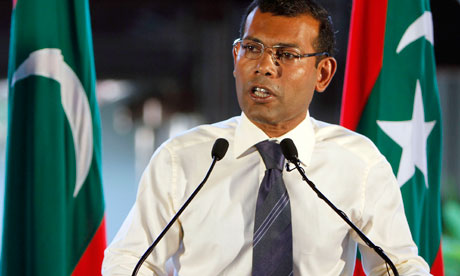
President Mohamed Nasheed's government was accused by opposition leader Mohamed Jameel Ahmed of working against the state religion, Islam, with the support of Christians and Jews. Photograph: Sinan Hussain/AP
The Maldives military has arrested the chief justice of the country's criminal court after he released an opposition leader who had been detained without a warrant for allegedly defaming the government.
The arrest of Judge Abdulla Mohamed on Monday has prompted all courts in the Maldives to boycott sessions on Tuesday, in what could become a showdown between the country's first freely elected government and the independent judiciary introduced by former pro-democracy political prisoner President Mohamed Nasheed after coming to power in 2008.
The arrest of a judge by the military is unprecedented in the Maldives, which became a multiparty democracy after 30 years of autocratic rule. It also sparked street protests in the capital of the Indian Ocean archipelago.
At least 200 protesters gathered near the police and military headquarters on Tuesday to demand adherence to court orders and the release of the arrested judge, but police and soldiers used batons to disperse them. One policewoman was injured in the scuffle.
A government statement quoted the foreign minister, Ahmed Naseem, as saying that Mohamed was arrested "for corruption, in particular for allowing his judicial decisions to be determined by political and personal affiliations and interests".
"The government of the Maldives fully supports and will always protect judicial independence," Naseem said. "However, judicial independence does not mean that judges are above the law and can behave as they see fit contrary to the laws of the land. A judge is a citizen of the Maldives no more or less important than any other citizen."
The country's supreme court, the prosecutor general's office and judicial services commission all issued statements calling the judge's arrest illegal and requesting his release.
The prosecutor general's office added that under the constitution a judge can be arrested only after a supreme court decision to do so.
With no positive response to their calls to release the judge, all other judges and court staff announced they were boycotting sessions and not extending detention orders on Tuesday.
Opposition activists said the arrest was in retaliation for the judge's ruling that opposition leader Mohamed Jameel Ahmed's detention a day earlier was illegal.
Police arrested Ahmed for allegedly defaming the government during a television interview in which he accused Nasheed's administration of working against the state religion, Islam, with the support of Christians and Jews. Opposition activists say the government is trying to use an old criminal defamation law to persecute them while it is not part of the current democratic law.
Religious debates have gained prominence in this Sunni Muslim nation of 300,000 people where practiing any other faith is forbidden.
http://www.guardian.co.uk/world/2012/jan/17/maldives-courts-chief-justice-arrest?INTCMP=SRCH
The arrest of Judge Abdulla Mohamed on Monday has prompted all courts in the Maldives to boycott sessions on Tuesday, in what could become a showdown between the country's first freely elected government and the independent judiciary introduced by former pro-democracy political prisoner President Mohamed Nasheed after coming to power in 2008.
The arrest of a judge by the military is unprecedented in the Maldives, which became a multiparty democracy after 30 years of autocratic rule. It also sparked street protests in the capital of the Indian Ocean archipelago.
At least 200 protesters gathered near the police and military headquarters on Tuesday to demand adherence to court orders and the release of the arrested judge, but police and soldiers used batons to disperse them. One policewoman was injured in the scuffle.
A government statement quoted the foreign minister, Ahmed Naseem, as saying that Mohamed was arrested "for corruption, in particular for allowing his judicial decisions to be determined by political and personal affiliations and interests".
"The government of the Maldives fully supports and will always protect judicial independence," Naseem said. "However, judicial independence does not mean that judges are above the law and can behave as they see fit contrary to the laws of the land. A judge is a citizen of the Maldives no more or less important than any other citizen."
The country's supreme court, the prosecutor general's office and judicial services commission all issued statements calling the judge's arrest illegal and requesting his release.
The prosecutor general's office added that under the constitution a judge can be arrested only after a supreme court decision to do so.
With no positive response to their calls to release the judge, all other judges and court staff announced they were boycotting sessions and not extending detention orders on Tuesday.
Opposition activists said the arrest was in retaliation for the judge's ruling that opposition leader Mohamed Jameel Ahmed's detention a day earlier was illegal.
Police arrested Ahmed for allegedly defaming the government during a television interview in which he accused Nasheed's administration of working against the state religion, Islam, with the support of Christians and Jews. Opposition activists say the government is trying to use an old criminal defamation law to persecute them while it is not part of the current democratic law.
Religious debates have gained prominence in this Sunni Muslim nation of 300,000 people where practiing any other faith is forbidden.
http://www.guardian.co.uk/world/2012/jan/17/maldives-courts-chief-justice-arrest?INTCMP=SRCH

Nessun commento:
Posta un commento